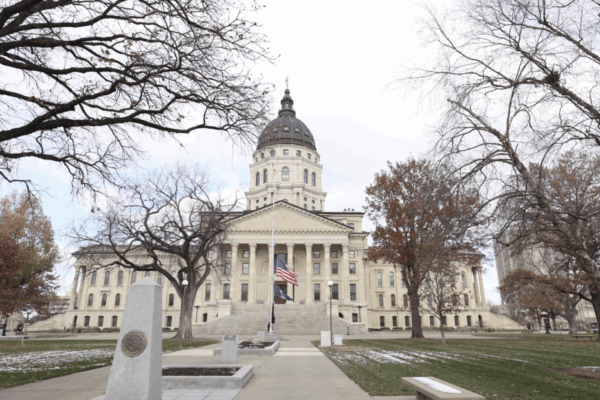A Kansas law that adopts the International Holocaust Remembrance Alliance’s (IHRA) definition of antisemitism has received mixed reactions from the University of Kansas’s Jewish community.
SB 44 was approved by Gov. Laura Kelly in early April. The bill declares antisemitism and antisemitic acts to be against public policy of the state, and it specifically mentions public education institutions.
Sen. Renee Erickson (R-Wichita), chair of the Senate Committee on Education, did not respond to multiple requests for comment about why the legislature chose to work this bill now.
According to the Kansas Legislative Research Department, multiple states including Missouri and Nebraska, have recently adopted similar bills.
The law adopts the IHRA’s definition but states that it is not legally binding. The IHRA’s working definition of antisemitism defines it as “a certain perception of Jews, which may be expressed as hatred toward Jews.”
The IHRA definition has been adopted by the U.S. government and over 35 states.
Zalman Tiechtel, a rabbi with KU’s Chabad organization, wrote in an email that the bill “empowers institutions to recognize and respond appropriately to antisemitism in all its forms.”
“As a Jewish campus leader, I have seen antisemitic incidents on the rise,” Tiechtel said. “This is why I believe that defining antisemitism in state policy is a vital step toward ensuring the safety and dignity of Jewish students and communities across Kansas.”
Dori Jezmir, a KU student who is part of Chabad, said she supports the bill and finds it empowering for Jewish students.
“I think it is super, super important for, like, the future of the Jewish people in Kansas,” Jezmir said. “I think it's powerful.”
Jezmir said she also has seen a rise in antisemitism on KU’s campus this past year.
“There are people that don't understand what they're saying on certain language, and they say it, but it turns out to be antisemitic,” Jezmir said. “They don't know it, but we feel it.”
Erinn Barcomb-Peterson, spokeswoman for KU, did not respond to multiple requests for comment about if the university has seen an increase in antisemitism on campus and if it is doing anything to combat it.
Other students say they do not support the bill and the IHRA’s definition. Some believe it conflates criticism of antisemitism with criticism of Israel.
Daniel Mercado, vice president of KU’s Jewish Students for People’s Liberation, said he finds the idea of the state of Kansas using the IHRA’s definition antisemitic itself.
He believes that the state’s adoption of this definition targets free speech on campus, specifically related to the conflict in Palestine.
“I believe that it will be used as a weapon against those who are exercising their free speech, specifically the people like me who are protesting the genocide,” Mercado wrote in a statement.
One example that the IHRA gives of antisemitism is “the targeting of the state of Israel,” but it states that “criticism of Israel similar to that leveled against any other country cannot be regarded as antisemitic.”
Tiechtel wrote in an email that “robust debate and criticism of government policies are part of everyday democratic life” in Israel.
Mercado, though, believes this is not how most people interpret the definition and instead view all criticism of Israel as inherently antisemitic.
“The inability for people to grapple with and criticize a government or ideology is a fundamental disservice and an insult to the first amendment and academic freedom,” Mercado wrote.
The ACLU of Kansas wrote testimony in opposition to the bill, stating it threatens free speech.
In 2023, the Human Rights Watch and 103 other civil society organizations urged the United Nations to not adopt the IHRA definition of antisemitism.
“In practice, however, the IHRA definition has often been used to wrongly label criticism of Israel as antisemitic, and thus chill and sometimes suppress, non-violent protest, activism and speech critical of Israel and/or Zionism,” the statement read.
The bill passed in the House 77-41, with seven representatives absent. It passed in the Senate 39-1.
Bella Waters is a junior at the University of Kansas from East Lansing, Michigan, majoring in journalism and history.
This article was edited by Associate News Editor Rylie Oswald. If the information in this article needs to be corrected, please contact [email protected]. We want to hear from you!
Copy article link
Save

